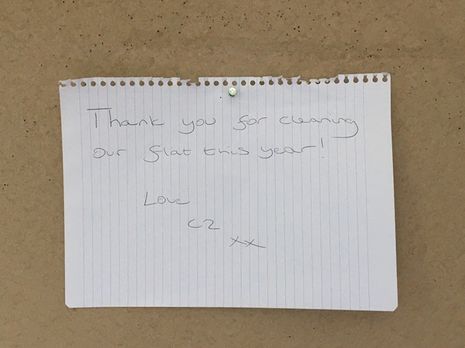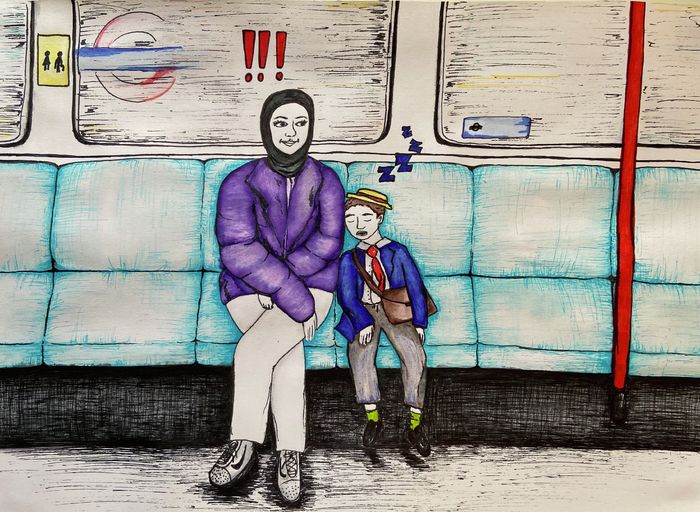From Cambridge to cleaning: An ode to my summer job
Esmé Kenney reflects on how her job as a cleaner during the summer vacation opened her eyes to the role cleaners play in the lives of university students
At the beginning of the summer holidays, like many students across the country I found myself with a lot of time and little to do. With my first year of university done, one that was only intensified by lockdowns and restrictions, I was well and truly ready to break out of the academic ‘bubble’ that I had grown accustomed to, earn some money and retain some semblance of routine. So with that, I embarked on my search for a summer job.
“It was also a huge eye-opener into how much work really goes into maintaining student accommodation”
After applying for various roles, I managed to get a job as a cleaner at Sheffield University’s halls of residence. And thus, I swapped my highlighters and JSTOR articles for a sponge and a half empty bottle of Ecosol. On a typical day I could be found cleaning rooms, bathrooms, kitchens and corridors. I was part of a small team of casual workers, who were mostly students themselves, as well as a few permanent staff members who supervised us. It was us and our limited supply of Henry Hoovers against the world.
The experience certainly made me reflect on the role that cleaners play in our university lives, as well as the attitudes that students hold towards them. It was also a huge eye-opener into how much work really goes into maintaining student accommodation.
On a surface level, the most memorable aspect of the job was realising how utterly disgusting student accommodation can be. Stray hairs, nail clippings and ominous stains on the wall were just some of the horrors left behind in people’s rooms. The kitchens weren’t much better either. I expected to get used to it eventually, but the sensation of cleaning a fridge that had been switched off and left to rot for four months was just as harrowing every time. The worst experience of the entire job was the time that me and my colleague opened the door to a mouldy fridge freezer, and a swarm of fruit flies flew out.
“At the end of the day, it’s still the cleaners that have to deal with the mess they left behind”
What really struck me though was one particularly awful flat and their utter disregard for their reliable cleaners working endlessly behind the scenes. The permanent cleaning staff warned us that it was the worst one on the block, but nothing could have prepared me for finding rotting chips, empty coffee cups, a broken photo frame and random coat hangers strewn all over the corridor. I don’t even want to describe how bad the rooms were. It’s fairly typical to find one room in a flat that’s a bit dirty, but for an entire flat to be equally disgusting was a rarity. The level of mess was impossible to justify.
Beyond the mess was the attitude of the occupants; the permanent cleaners told us the students living there had been extremely rude to them to the point that they eventually decided it wasn’t even worth coming in to clean their flat during term, as it would only get trashed as soon as they left.

While we had some solace in knowing that these students would have been fined, I can’t help but feel that it was an easy way out that only distanced them from the consequences of their own actions. At the end of the day, it’s still the cleaners that have to deal with the mess they left behind.
There seems to be a cognitive dissonance amongst certain individuals, who look down on cleaners and treat them with disrespect, yet still rely on them to maintain their living standards. This a particularly ungrateful attitude given the coronavirus pandemic, when cleaners have put their own health at risk to clean student accommodation, especially when infection rates amongst students were rising.
Yet, this problem is not the sole responsibility of a snooty, obnoxious few. No matter how informed we may be about the theoretical notions of classism and inequality, many of us, preoccupied by the pursuit of academic achievement, are guilty of taking cleaners for granted. This is something that our society seems to normalise. Despite the fact that cleaners have been key workers during the pandemic, their immense contribution to students’ safety remains invisible.
I had many interesting conversations with the permanent cleaning staff, who spoke about their lives, families, and other jobs. They also asked lots of questions about university to those of us who were students. I appreciated the opportunity to connect with people that also lived in my home city, and who experienced it in different ways to me.
As students, we need to be more aware and more appreciative of the work cleaners do. Something as simple as having a conversation with the cleaners whilst they clean your room, or leaving a thank you note at the end of term, could go a long way. If nothing else, the pandemic has taught us how important our key workers are to our society; it costs nothing to show gratitude.
Having returned to the academic bubble of Cambridge, I’m surprised at how much I miss my summer job. I consider myself lucky to have gained an insider’s look into the work cleaners do, and it’s something I think about a lot now that I’m back in student accommodation. Then again, I doubt that Sheffield’s halls of residence will have seen the last of me.
 News / Eight Cambridge researchers awarded €17m in ERC research grants27 December 2025
News / Eight Cambridge researchers awarded €17m in ERC research grants27 December 2025 News / Downing investigates ‘mysterious’ underground burial vault 29 December 2025
News / Downing investigates ‘mysterious’ underground burial vault 29 December 2025 News / News in Brief: carols, card games, and canine calamities28 December 2025
News / News in Brief: carols, card games, and canine calamities28 December 2025 Sport / Hard work, heartbreak and hope: international gymnast Maddie Marshall’s journey 29 December 2025
Sport / Hard work, heartbreak and hope: international gymnast Maddie Marshall’s journey 29 December 2025 Interviews / Meet Juan Michel, Cambridge’s multilingual musician29 December 2025
Interviews / Meet Juan Michel, Cambridge’s multilingual musician29 December 2025







